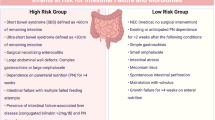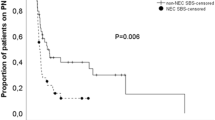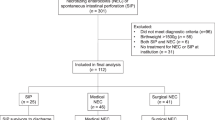Abstract
The provision of appropriate nutritional support is an essential part of the primary and adjunctive management of many gastrointestinal (GI) disorders in neonatology and pediatrics. Few conditions in neonatology pose as great a challenge as intestinal failure or short bowel syndrome (SBS). The latter, SBS, is a complex disorder affecting normal intestinal physiology with nutritional, metabolic and infectious consequences. It is a result of the alteration of intestinal digestion and absorption following extensive bowel resection. Medical management of SBS is a very labor-intensive problem. Nutritional support and monitoring are of paramount importance, and long-term morbidity and mortality will depend on recognition and careful management of associated complications. With the increased use of intestine or intestine–liver transplant, maintaining these infants in good ‘health’ to allow transplantation will go a long way in achieving good long-term outcomes.
This is a preview of subscription content, access via your institution
Access options
Similar content being viewed by others
References
Touloukian RJ, Smith GJW . Normal intestinal length in preterm infant. J Pediatr Surg 1983; 18: 720–723.
Taylor SF, Sokol RJ . Infants with short bowel syndrome. In: Hay WM (ed). Neonatal Nutrition and Metabolism. Mosby: St Louis, MO, 1991, pp 432–450.
Meyers WC, Jones RS . Hyperacidity and hypergastrinemia following extensive intestinal resection. World J Surg 1979; 3: 539–544.
Strause E, Gerson E, Yalow RS . Hypersecretion of gastrin associated with short bowel syndrome. Gastroenetrology 1974; 66: 175–180.
Valman HB, Roberts PD . Vitamin B12 absorption after resection of ileum in childhood. Arch Dis Child 1974; 49: 171–173.
Hoffman AF . The enterohepatic circulation of bile acids in health and disease. In: Sleisinger MH, Fordtran JS (eds). Gastrointestinal Disease: Pathophysiology Diagnosis Management. WB Saunders: Philadelphia, 1983, pp 115–134.
Mekhjian HS, Philips SF, Hofmann AF . Colonic secretion of water and electrolytes induced by the bile acids: perfusion studies in man. J Clin Invest 1977; 50: 1569–1577.
Chadwick VS, Gaginella TS, Carlson GL, Debongnie JC, Phillips SF, Hofmann AF . Effects of molecular structure on bile acid-induced alterations in absorptive function, permeability and morphology in the perfused rabbit colon. J Lab Clin Med 1979; 94: 661–674.
Johnson LR, Copeland EM, Dudrick SJ, Lichtenberger LM, Castro GA . Structural and hormonal alterations in the gastrointestinal tract of parenterally fed rats. Gastroenterology 1975; 68: 1177–1183.
Hanson WR, Osborne JW, Sharp JG . Compensation by the residual intestine after intestinal resection in the rat: I. Influence of amount of tissue removed. Gastroenterology 1977; 72: 692–700.
Parker P, Stroop S, Grren H . A controlled comparison of continuous versus intermittent feedings in the treatment of infants with intestinal disease. J Pediatr 1981; 99: 360–364.
Newcomer AD . Surface digestion of carbohydrates. Mayo Clin Proc 1973; 48: 620–623.
Farrell JJ . Digestion and absorption of nutrients and vitamins. In: Feldman M, Friedman LS, Sleisenger MH (eds). Sleisinger and Fordtran's Gastrointestinal and Liver Disease: Pathophysiology, Diagnosis, Management, Vol. 2, 7th edn. Saunders: Philadelphia, 2002, pp 2385–2398.
Silk DB, Fairclough PD, Clark ML, Hegarty JE, Marrs TC, Addison JM et al. Use of a peptide rather than free amino acid nitrogen source in chemically defined ‘elemental’ diets. JPEN 1980; 4: 548–553.
Author information
Authors and Affiliations
Corresponding author
Ethics declarations
Competing interests
The authors declare no conflict of interest.
Additional information
This paper resulted from the Evidence vs Experience in Neonatal Practices conference, 19 to 20 June 2009, sponsored by Dey, LP.
Rights and permissions
About this article
Cite this article
Bhatia, J., Gates, A. & Parish, A. Medical management of short gut syndrome. J Perinatol 30 (Suppl 1), S2–S5 (2010). https://doi.org/10.1038/jp.2010.100
Published:
Issue Date:
DOI: https://doi.org/10.1038/jp.2010.100
Keywords
This article is cited by
-
Current treatment paradigms in pediatric short bowel syndrome
Clinical Journal of Gastroenterology (2018)
-
Medical Update and Potential Advances in the Treatment of Pediatric Intestinal Failure
Current Gastroenterology Reports (2012)



